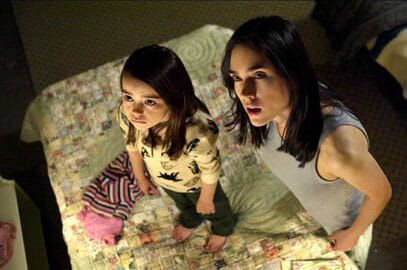Repackaged from a 2002 Japanese film (sharing the same crossover formula as The Ring), the film follows recently divorced Dahlia (Jennifer Connelly) attempting to normalize the life of her six-year-old daughter Ceci (Ariel Gade). The centerpiece of this new life involves moving into an apartment complex a mere gondola trip away from Manhattan. Though nowhere near perfect, their haven in the towering structure is logistically ideal—$900 a month and only a block away from one of the city’s top public schools. But when a dark stain begins dripping blackish water in the bedroom, Dahlia, behaving more like a naïve teenager than a protective mother, opts to explore the situation herself. Soon, the mysterious disappearance of a girl on the floor above stirs hallucinatory migraines, wounds of Dahlia’s own jagged childhood. All the while, Ceci forms a medium between the girl and her mother, a cliché perfectly in synch with the five-cent psychoanalysis of ghosts in so many other recent genre titles.
Because of Salles’ blatant superiority over the material, all this painting by numbers feels like forced labor. Regaling complex and Polanski-imprinted sensibilities early on, Dark Water quickly veers from the psychological into the conventionally unfathomable. It’s basically The Ring, but synthesized, dulled and relocated to the claustrophobic interior of a condemned living space.
